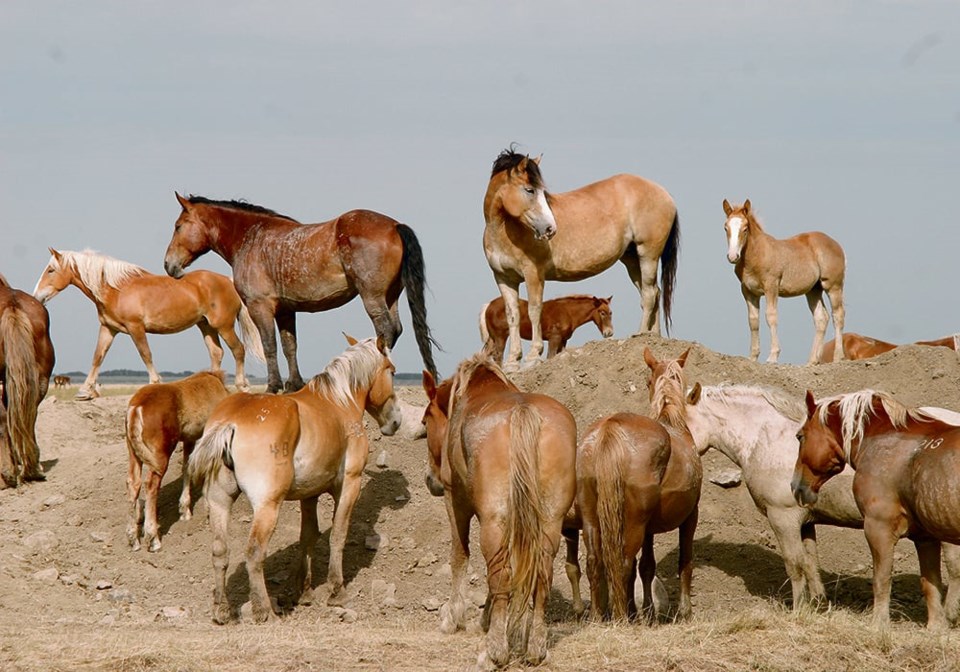REGINA — The House of Commons agriculture committee has passed a private member’s bill that would ban the air transport of live horses for slaughter.
Bill C-355 now goes back to the House of Commons for third reading, and if passed there would then move to the Senate for more scrutiny.
Animal Justice applauded the bill’s progress, saying Canada ships thousands of horses from Winnipeg, Edmonton and Calgary to Japan. There, the animals are fattened, slaughtered and eaten as a raw delicacy, the organization said.
“During the flights, the terrified horses endure heartbreaking suffering. They are confined to tiny wooden crates and denied food, water and rest for the entire journey, which legally can be up to 28 hours although some shipments have illegally gone longer,” the organization said in a news release.
“Over the years, horses have collapsed, suffered injuries and even died en route.”
The Canadian Food Inspection Agency has said there have been five deaths among 47,000 horses exported in the last 10 years. It said flights generally take 10 to 12 hours, but total shipping time must occur within 28 hours.
However, the Canadian Horse Defence Coalition said it had access to documents that showed six horses died in 2012 and three in 2011.
“Horses destined for human consumption are often overfed to the point of obesity. They are not likely to be administered medications in the event of illness or injury,” said CHDC president Sinikka Crosland during committee testimony.
She noted the sport horse world recognizes the need to feed and water those horses during long transport.
Dr. Trevor Lawson, president of the Canadian Veterinary Medical Association, testified that the organization does not support the bill.
The animals have a good quality of life on their farms of origin, he said.
“Regarding the transport in question, it was determined that these animals did not experience worse welfare or outcomes than any other food animal. In fact the available data suggests better outcomes in general,” he said April 9.
Lawson said amended transport regulations in 2020 included floor and head space provisions and strict container requirements.
“Regarding the current proposed bill, Bill C-355, the CVMA is cognizant of and is concerned that the potential for disruptions to the current supply of Canadian horses for this market could lead to unintended negative consequences. These includes the significantly decreased value of the horses in the supply chain and the concomitant potential decrease in incentivized high welfare standards,” he said.
“As well, animal welfare would be at risk due to the current lack of slaughter capacity to process these horses and the resultant uncertain final disposition of these animals.”
Banning live horse export for slaughter was in the federal agriculture minister’s mandate letter after the last election.
Tim Louis, the Liberal MP from Kitchener-Conestoga, sponsored the bill.
Some opposition attempts to amend the bill were procedurally handcuffed by its narrow scope as written. Conservative agriculture critic John Barlow wanted the bill to include improvements to health and safety for the transport of all horses. It would allow air export under certain conditions.
Chair Kody Blois said he was sympathetic to what the amendments would do, but he could not allow them.
“It is a very clear legislative bill that says this activity just cannot happen, regardless of whether or not there is other measures that can be taken,” he said.
Saskatchewan Conservative MP Warren Steinley wanted the legislation amended to come into force in five years instead of 18 months.
“Many stakeholders have told us … if this does come into effect, the effects it will have on their livelihood, on the gestation period of horses and animal health consequences and the fact that it will destroy people’s livelihoods, forcing them to find other means to make a living, which could include retraining in other education for themselves,” he said.
“I think it is incumbent that we do think about the people that have put their heart and soul into raising these animals.”
That amendment was defeated.
After the committee agreed to pass the bill, Barlow raised an issue he said he didn’t think the committee had ever experienced.
He said potential witnesses who raise these horses wouldn’t come to the committee and talk about why the industry is important.
“We had a number of witnesses who eventually decided not to appear at committee because of the intimidation and the reaction they were getting from phone calls…. A couple of witnesses had to call the RCMP on multiple occasions as a result of protests or intimidation at their farms or at their businesses,” he said.
Barlow said while some witnesses were able to remain anonymous, others felt too intimidated. He moved that the clerk and analysts “prepare a brief report outlining the material facts of a potential breach of privilege related to the reports of threats, harassment and intimidation against, and the efforts to deter the appearances of potential witnesses and witnesses in relation to the committee study of Bill C-355 … and that the chair present this report to the House forthwith.”
After debate, the committee agreed to the motion except for the clause about reporting it to the House of Commons. Members want to see the report first.




